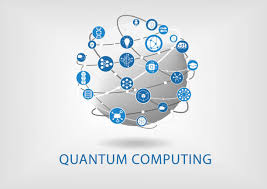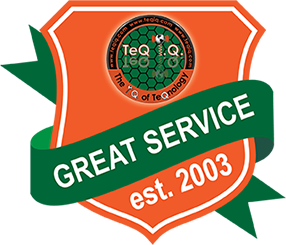
"Share this Info and Help a Friend"

NEW: AI Mobile and Desk Phone Service!
"AI Summary & Call Recording Transcribed on your Mobile/Desk Phone and PC"
- Perfect: You're Not Near their Desk Phone when the Phone Rings.
- Perfect: You Don't want to Call or Text from your Personal Cellphone Number.
- Perfect: You Don't want Calls on your Cellphone After Hours and Go to Voicemail.
- Perfect: Take Notes on all Calls with AI Assistant and Call Recording Transcription.
Have your All Phone Numbers Make Calls/SMS/MMS on your Mobile/Desk Phone/PC.
https://www.teqiq.com/phone
YouTube Video "IBM Makes Quantum Breakthrough"
One of the main obstacles to bringing a commercial quantum computer to market is reducing qubit error rates, the analog of bit error rates in the digital world. IBM has reportedly made an advancement in the space by running its advanced error-correction algorithm on off-the-shelf AMD hardware.
IBM researchers reported that not only did they run their quantum algorithm on standard AMD FPGA chips, but it ran 10 times faster than needed to keep pace with a quantum computer.
It’s a significant breakthrough in error correction, which is half the battle for IBM getting to its 2029 goal for its Starling large-scale quantum computer.
This is significant because it sounds like it’s a year ahead of schedule in terms of error correction.
When IBM introduced its new error-correcting algorithm earlier this year, it proposed running it on a decoder called BP+OSD. The decoder is the classical algorithm that runs in parallel to the quantum algorithm. It identifies which corrections to apply based on information from the quantum correction code.
There were two problems with that decoder. It’s not very accurate, so your error-correcting code isn’t as efficient as it could be and it wasn’t fast enough, which is a really big problem since it can exponentially slow down your quantum computer.
Then IBM proposed using a new decoder, called Relay-BP, which it claimed was faster and more accurate. In the recently released research, IBM actually implemented the decoder on an AMD FPGA and found that it was indeed fast enough not to slow down the quantum computer.
Classical Computing’s Role in Quantum Progress
With this latest development, IBM is reinforcing the fact that classical computers will govern and enhance the performance of quantum computers in the foreseeable future, benefiting from classical compute capabilities is critical to the advancement of quantum computing hardware.
IBM’s result shows that classical hardware can now simulate and optimize certain quantum error correction workflows that were once believed to require small quantum processors.
Running a QEC algorithm efficiently on AMD CPUs demonstrates progress in modeling and control software, rather than in qubit performance itself.
The decisive factors remain hardware-related, such as stable logical qubits, error thresholds, and scalable architectures. A useful fault-tolerant quantum computer by 2029 is possible but still depends more on advances in hardware physics than on classical simulation results.
Quantum Computers in 2026?
Practical quantum computers will be with us by next year, and any further advancement in quantum barely needs this IBM invention. So many quantum computers are coming from so many vendors that this one improvement is just another drip in a very large pail.
This new technique is just one improvement in quantum qubit error correction, there are many others.
Cheaper is better, but the early-adopting companies looking to quickly adopt the best quantum computers are going to quibble over even tens of millions of dollars in price differences.
It makes sense for AMD’s FPGAs to become the first type of chip paired with IBM’s quantum systems, as FPGAs’ relatively low production volume makes it optimal for test use cases. FPGAs are cheaper than dedicated quantum chips, such as IBM’s Heron, but they are still much more expensive than the more common CPUs or GPUs in unit costs.
Adding FPGAs into quantum systems is a step in the right direction that lowers quantum’s overall costs. We do not see this breakthrough alone leading to widespread quantum adoption, given the lack of commercially feasible use cases for the existing technology.
Quantum Security Implications
This development is concerning because it shows a path to relevance by addressing the stubbornly persistent engineering challenge of error handling in quantum computing. The critical difference here is that the potential solution utilizes FPGA chips that are largely available and do not require new fabrication processes. If this method proves to be viable, we could be looking at an even closer deadline for cryptographically relevant quantum computers, which are available for both nation-states and commercial usage alike. This means both the government and industry could be, in essence, out of time to make meaningful progress towards adopting the new quantum safe standards.
Running a real-time quantum error-handling loop on off-the-shelf AMD FPGAs signals that the classical control stack for quantum systems is maturing and becoming cheaper. That lowers barriers for scale and reproducibility, pulls these systems closer to regular data center practices and spreads the hardware supply chain across widely used components. It is encouraging for short-term progress toward more stable qubits and for IBM hitting its roadmap, yet it does not change the near-term risk picture for breaking today’s encryption.
The security story, however, shifts quickly once control moves to commodity gear, because the attack surface grows beyond bespoke electronics and into firmware, drivers, orchestration software, and the physical interfaces that bind racks to cryogenic devices.
IBM’s announcement is the latest development in what feels like a nonstop run of signals about just how quickly quantum is advancing, from NIST’s guidelines for post-quantum cybersecurity.
What used to be sparse signals about an impending threat have become very dense signals that are appearing on a weekly basis. Timelines are accelerating for the day when a quantum computer can break all current public key cryptography systems, which means that there are over 20 billion devices that have to be migrated to post-quantum in just a few short years.
If this tip helps and you would like to donate click on the button. Thanks In Advance.
________________________________________________________________________________________________________
"Fortune Favors, Who Value Time over Money!"
"TeQ I.Q. was the 1st IT Company to Deliver Cloud Solutions since 2003"
Tech issues taking up your Time?
"TeQ I.Q. Makes Your Technology Secure and Protected"
Do you have Tech Frustrations like your Computer, Internet, Phone, Cellphone, Camera, TV, Car?
"We Take Away Your Tech Frustrations and Give You the Free Time You Deserve!"
Call Robert to ask all your Technology questions.
For Free Consultation Call Now Robert Black at (619) 255-4180 or visit our website https://www.teqiq.com/
Chase Bank and Others Trust TeQ I.Q. with their IT and TeQnology so can you!



